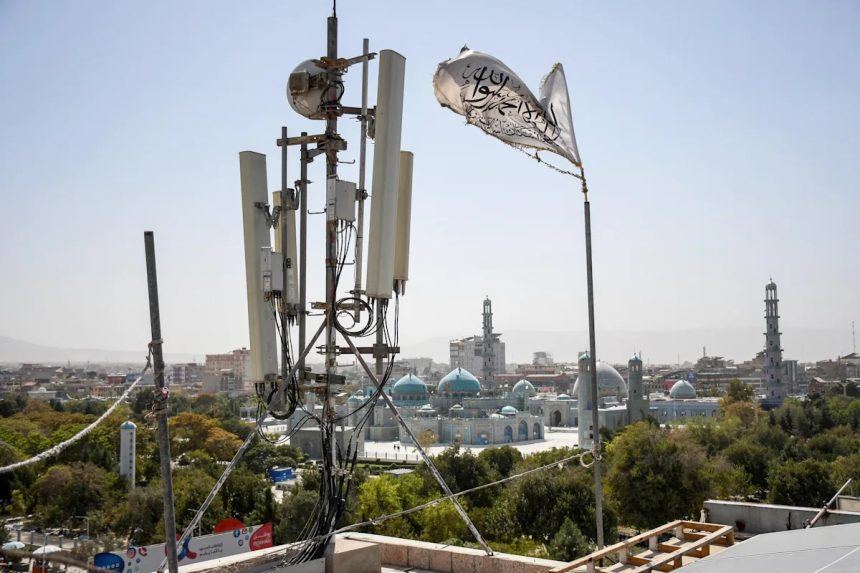Afghanistan is in the midst of a communications blackout, just weeks after Taliban authorities began severing fibre optic connections in multiple provinces, in what appears to be the Islamist regime’s latest crackdown.
“Afghanistan is now in the midst of a total internet blackout as Taliban authorities move to implement morality measures, with multiple networks disconnected through the morning in a stepwise manner; telephone services are currently also impacted,” the cybersecurity and internet governance watchdog Netblocks said Monday in a post on X.
TOPSHOT – A Taliban flag flutters near telecom equipment installed over a rooftop providing internet services overlooking Hazrat-e-Ali Shrine, or Blue Mosque, in Mazar-i-Sharif on September 16, 2025, as the Taliban administration banned fibre-optic internet in Balkh province. / Credit: ATIF ARYAN/AFP via Getty Images
Afghanistan’s Taliban authorities began to restrict internet service earlier this month, shutting down high-speed connections in several regions across the country, the French news agency AFP reported Monday. CBS News has independently verified that internet links have now been cut nationwide.
The Taliban’s leadership has not publicly commented on the blackout. But on Friday, Haji Zahid, a local Taliban spokesperson in the northern province of Balkh, said in a post on X that the ban had been ordered by their leader, Haibatullah Akhundzada, “to prevent immoral activities.”
Afghan television channel TOLO said Monday that its broadcast had been disrupted by the communications crackdown.
TOLO News also reported that mobile phone internet services have been shut down. It cited sources within the Taliban that indicated mobile services could soon be restored but with a lower-capacity 2G signal.
The U.S. and most other Western nations have refused to recognize the Taliban as Afghanistan’s legitimate government since it retook control in 2021, following the Biden administration’s chaotic withdrawal from the country.
The country’s Taliban rulers have dramatically rolled back the rights of women and girls, detained journalists, and cracked down on public dissent since retaking power.
The country faces one of the world’s worst humanitarian crises, according to Human Rights Watch, exacerbated by donor governments’ aid cuts and the return of 1.9 million refugees expelled from Iran and Pakistan. Afghanistan is also still recovering from a devastating earthquake that killed nearly 3,000 people earlier this month.
Torek Farhadi, a former senior advisor to the International Monetary Fund and the World Bank, told CBS News on Monday that the lack of internet access will be devastating for ordinary people in Afghanistan.
“For Afghanistan’s youth, it is definitely another costly fallback if it continues. It closes the door on online education, it severely handicaps business owners who communicate with clients,” Farhadi said. “It is a deliberate decision to lead society to a blind spot.”
After Charlie Kirk assassination, Utah Gov. Cox urges U.S. away from division, violence
Government shutdown likely, CBS News’ Robert Costa says after conversation with Trump









